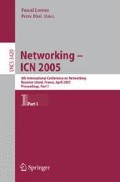Abstract
In this paper, we are interested in real-time flows requiring quantitative and deterministic Quality of Service (QoS) guarantees. We focus more particularly on two QoS parameters: the worst case end-to-end response time and jitter. We consider a non-preemptive scheduling of flows, called fp/dp \(^{\rm {\sc *}}\), combining fixed priority and dynamic priority established on the first node visited in the network. Examples of such a scheduling are fp/fifo \(^{\rm {\sc *}}\) and fp/edf \(^{\rm {\sc *}}\). With any flow is associated a fixed priority denoting the importance of the flow from the user point of view. The arbritation between packets having the same fixed priority is done according to their dynamic priority. A classical approach used to compute the worst case end-to-end response time is the holistic one. We show that this approach leads to pessimistic upper bounds and propose the trajectory approach to improve the accuracy of the results. Indeed, the trajectory approach accounts for worst case scenarios experienced by a flow along its trajectory. It then eliminates scenarios that cannot occur.
Access this chapter
Tax calculation will be finalised at checkout
Purchases are for personal use only
Preview
Unable to display preview. Download preview PDF.
References
Tindell, K., Burns, A., Wellings, A.J.: Analysis of hard real-time communications. Real-Time Systems 9, 147–171 (1995)
Liu, J.: Real-time systems. Prentice Hall, New Jersey (2000)
Baruah, S., Howell, R., Rosier, L.: Algorithms and complexity concerning the preemptive scheduling of periodic real-time tasks on one processor. Real-Time Systems 2, 301–324 (1990)
Martin, S., Minet, P.: Worst case end-to-end response times for non-preemptive FP/DP* scheduling. INRIA Research Report, No 5418 (December 2004)
Tindell, K., Clark, J.: Holistic schedulability analysis for distributed hard real-time systems. Microprocessors and Microprogramming, Euromicro Jal 40 (1994)
Spuri, M.: Holistic analysis for deadline scheduled real-time distributed systems, INRIA Research Report No 2873 (April 1996)
Le Boudec, J., Thiran, P.: Network calculus: A theory of deterministic queuing systems for the Internet. In: Thiran, P., Le Boudec, J.-Y. (eds.) Network Calculus. LNCS, vol. 2050, p. 3. Springer, Heidelberg (2001)
Parekh, A., Gallager, R.: A generalized processor sharing approach to flow control in integrated services networks. IEEE ACM Transactions on Networking (1994)
Author information
Authors and Affiliations
Editor information
Editors and Affiliations
Rights and permissions
Copyright information
© 2005 Springer-Verlag Berlin Heidelberg
About this paper
Cite this paper
Martin, S., Minet, P. (2005). Holistic and Trajectory Approaches for Distributed Non-preemptive FP/DP* Scheduling. In: Lorenz, P., Dini, P. (eds) Networking - ICN 2005. ICN 2005. Lecture Notes in Computer Science, vol 3420. Springer, Berlin, Heidelberg. https://doi.org/10.1007/978-3-540-31956-6_35
Download citation
DOI: https://doi.org/10.1007/978-3-540-31956-6_35
Publisher Name: Springer, Berlin, Heidelberg
Print ISBN: 978-3-540-25339-6
Online ISBN: 978-3-540-31956-6
eBook Packages: Computer ScienceComputer Science (R0)

